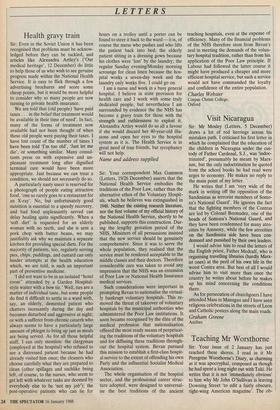Sir: Your correspondent Max Gammon (Letters, 19/26 December) asserts that
the National Health Service embodies the traditions of the Poor Law, rather than the alternative ethos of the Voluntary Hospit- als, which he believes was extinguished in 1948. Neither the existing research literature, nor the first volume of my official history of the National Health Service, shortly to be published, supports this construction. Dur- ing the lengthy gestation period of the NHS, Ministers of all persuasions insisted that the new service should be genuinely comprehensive. Since it was to serve the whole population, they realised that the service must be rendered acceptable to the middle classes and their doctors. Therefore considerable care was taken to avoid any impression that the NHS was an extension of Poor Law or National Health Insurance medical services.
Such considerations were important in prompting Bevan to nationalise the virtual- ly bankrupt voluntary hospitals. This re- moved the threat of takeover of voluntary hospitals by the municipal authorities who administered the Poor Law institutions. It soon became recognised by the elite of the medical profession that nationalisation offered the most ready means of perpetuat- ing the traditions of the voluntary hospitals and for diffusing these traditions through- out the hospital system. Bevan pursued this mission to establish a first-class hospit- al service to the extent of offending his own Party and the influential Socialist Medical Association.
The whole organisation of the hospital sector, and the professional career struc- ture adopted, were designed to universal- ise the best traditions of the ancient teaching hospitals, even at the expense of efficiency. Many of the financial problems of the NHS therefore stem from Bevan's zeal in meeting the demands of the volun- tary hospital tradition, rather than from his application of the Poor Law principle. If Labour had followed the latter course it might have produced a cheaper and more efficient hospital service, but such a service would not have commanded the loyalty and confidence of the entire population.
Charles Webster
Corpus Christi College, Oxford


















































 Previous page
Previous page